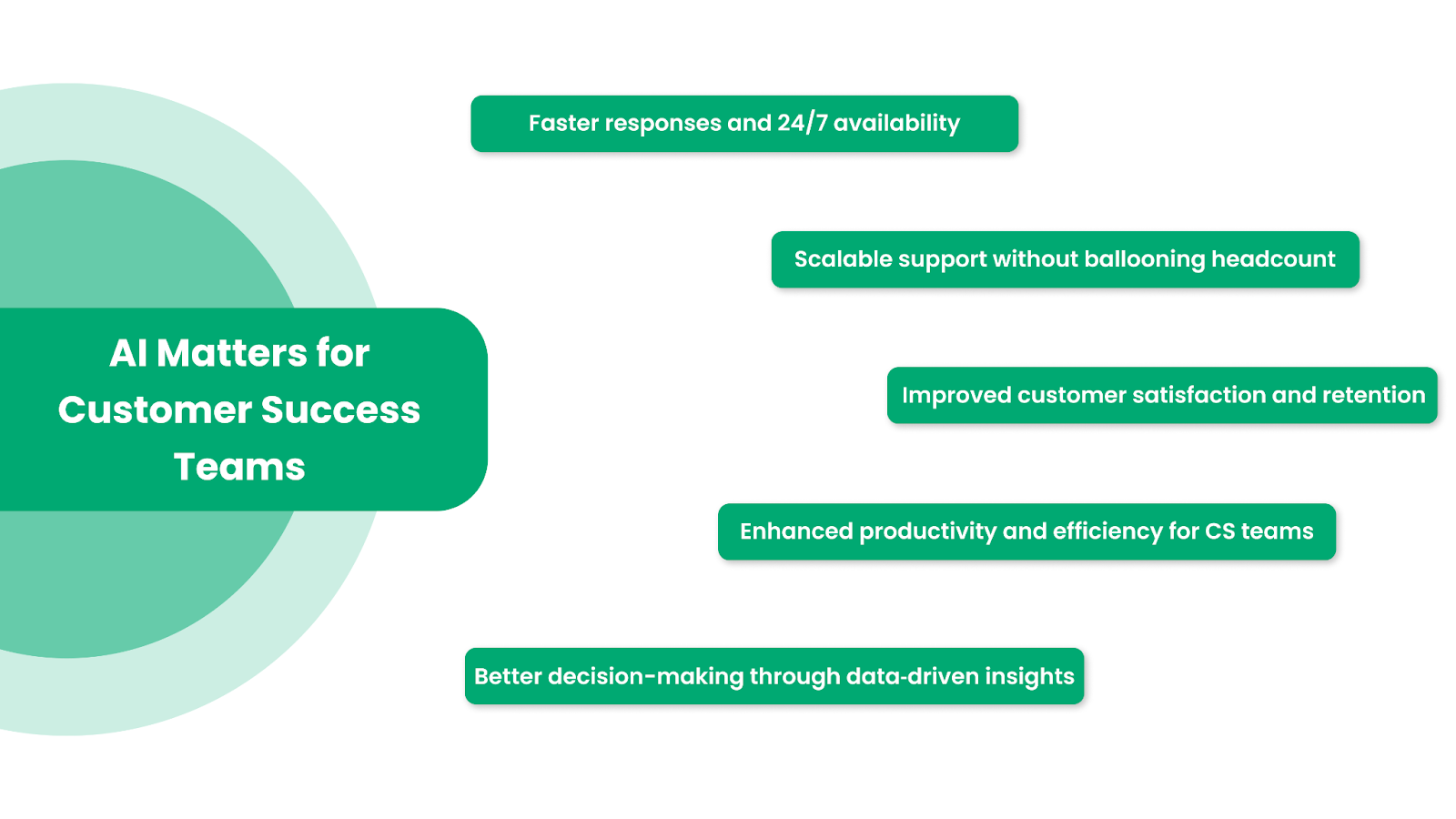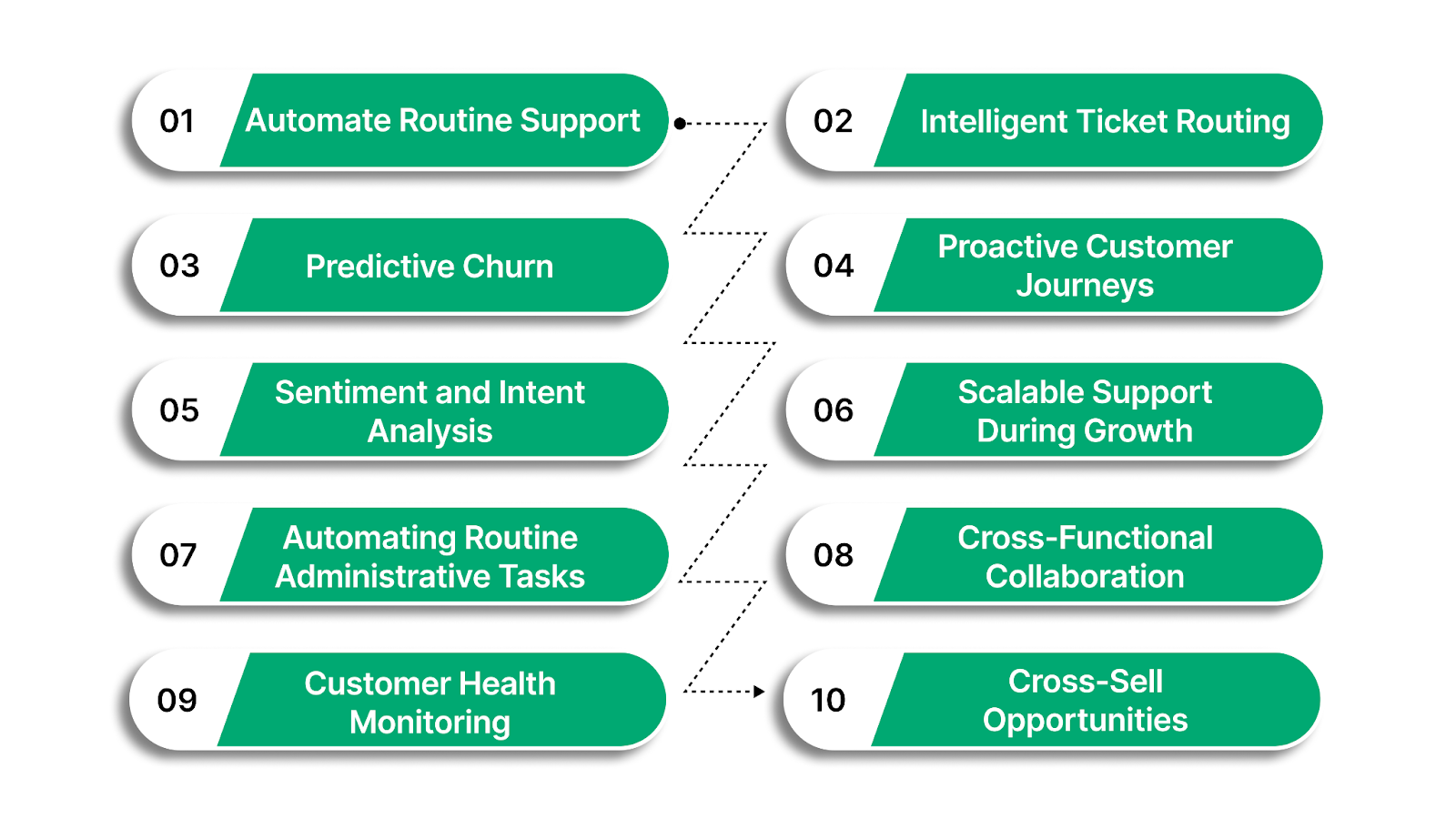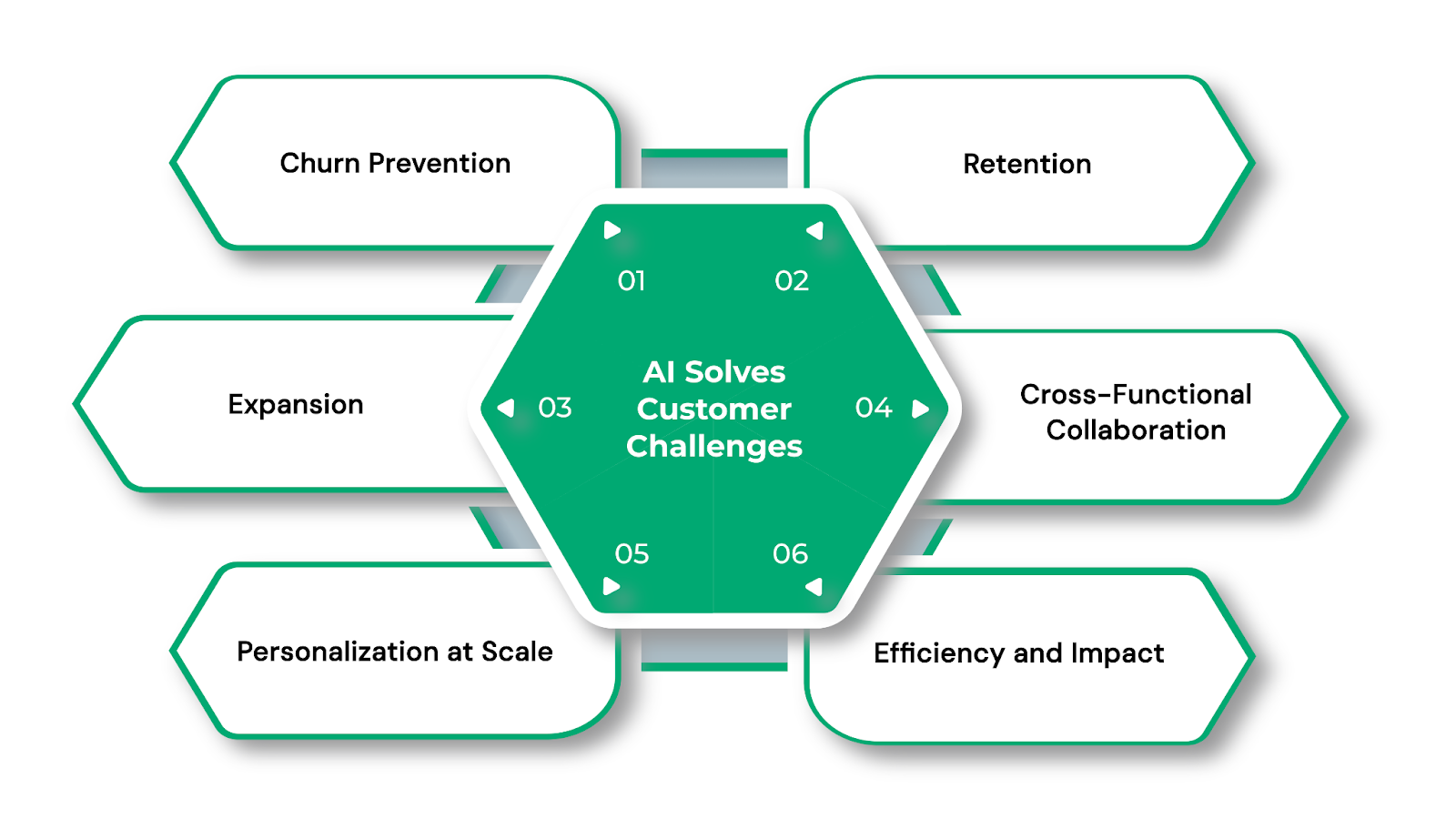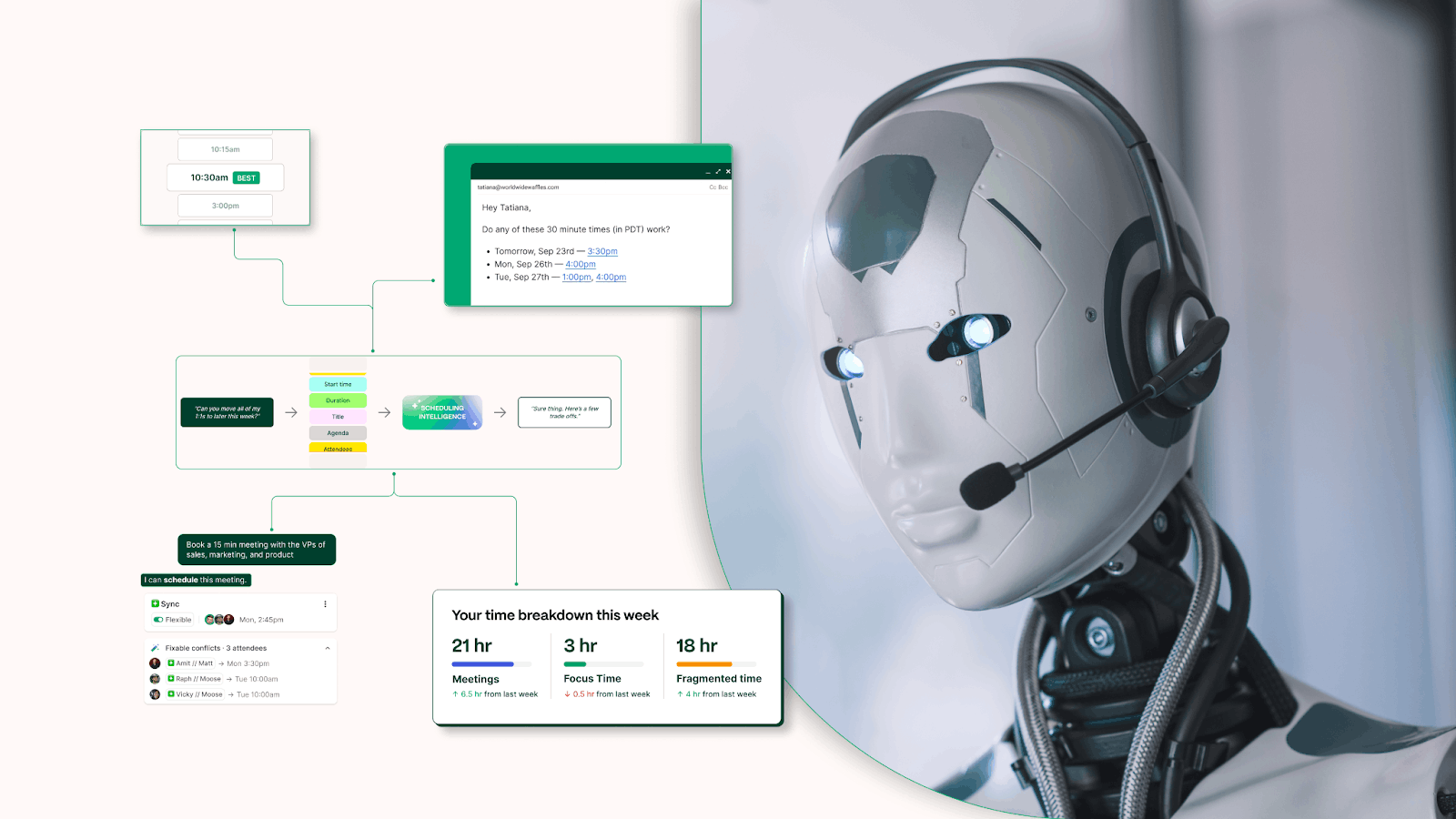As customer demands grow, many customer-success teams are struggling to keep up. A recent survey found that 66% of Customer Success Managers (CSMs) spend a significant portion of their workday on repetitive administrative tasks, tasks that could easily be automated.
When teams are bogged down with these tasks, it leads to burnout, slower response times, and higher turnover. The result is not only a decrease in service quality but also frustrated customers, increased churn, and missed growth opportunities.
The good news is that AI-powered tools can help. By automating routine tasks, providing predictive insights, and helping teams prioritize effectively, AI for customer success can help teams scale without sacrificing quality or employee well-being.
Key Takeaways
- AI Automates Routine Tasks: AI chatbots, virtual agents, and automated ticket triaging handle common inquiries and repetitive tasks, allowing customer success managers (CSMs) to focus on strategic activities.
- Predicts and Prevents Churn: AI analyzes customer behavior and engagement patterns to predict churn, helping teams engage with at-risk customers and improve retention.
- Personalizes Customer Engagement: AI creates tailored, proactive customer journeys by analyzing data like usage patterns, support tickets, and behavior, delivering relevant communication at the right time.
- Improves Cross-Functional Collaboration: AI provides actionable insights that can be shared across teams like Sales, Marketing, and Product, aligning strategies and improving customer satisfaction.
- Scales Support Without Adding Headcount: With AI handling 24/7 support and routine tasks, customer success teams can scale their efforts and serve more customers without overloading staff.
The benefits extend far beyond what customers see on their end. When implemented thoughtfully, AI transforms the daily reality of customer success teams themselves.
Why AI Matters for Customer Success Teams, Not Just for Customers?

Adopting AI in customer‑success operations offers tangible advantages for both teams and customers.
- Faster responses and 24/7 availability: AI‑powered customer success tools, such as chatbots or automated agents, make it possible to respond instantly.
- Scalable support without ballooning headcount: As customer volume grows, AI handles routine tasks like ticket triage, basic queries, and status updates, letting your human customer‑success reps focus on complex, high‑value work.
- Improved customer satisfaction and retention: AI enables personalized, proactive interactions by surfacing insights from usage data, anticipating customer needs, and offering timely support.
- Enhanced productivity and efficiency for CS teams: By automating repetitive work, AI frees up time for more meaningful tasks. Agents spend less time on data entry and more on relationship‑building and strategic account management.
- Better decision-making through data‑driven insights: AI analyzes large volumes of customer interaction and behavior data, helping teams spot trends, identify at‑risk accounts, and prioritize outreach or interventions.
Also Read: How Automated Planning and Scheduling Shapes AI Workflows|Clockwise
These advantages become tangible when applied to specific workflows. Here are ten proven applications that customer success teams are using to transform their operations.
Top 10 Ways to Use AI for Customer Success

These AI-driven strategies help teams improve efficiency, enhance customer satisfaction, and drive growth, all while scaling operations without overwhelming the team.
1. Automate Routine Support and Self-Service
AI chatbots and virtual agents automate routine customer interactions, answering frequently asked questions and resolving common issues instantly. This increases customer satisfaction by providing 24/7 support and reducing wait times.
With AI handling repetitive tasks, customer success managers (CSMs) can focus on more complex inquiries and proactive engagement, boosting efficiency across the board.
2. Intelligent Ticket Routing & Prioritization
AI helps optimize ticket handling by categorizing and routing tickets based on their urgency and complexity. This way, the high-priority issues are addressed first, reducing response time and streamlining workflows.
Clockwise’s Flexible Meetings feature allows customer success teams to automatically adjust their schedules to handle urgent tickets without conflicting with other scheduled activities.
3. Predictive Churn and Risk Detection
AI’s ability to predict churn is a game-changer for customer success teams. By analyzing customer behavior patterns, such as product usage, engagement frequency, and support interactions, AI can identify early warning signs of churn. This allows CSMs to proactively engage with at-risk customers, addressing concerns before they lead to churn.
Predictive analytics empowers teams to act on data-driven insights, improving retention and ensuring long-term customer loyalty.
4. Personalized, Proactive Customer Journeys
AI empowers customer success teams to craft highly personalized journeys tailored to each customer’s needs and behaviors. By analyzing data such as purchase history, engagement levels, and support tickets, AI suggests customized outreach, onboarding experiences, and engagement plans.
This approach helps customers receive timely, relevant communication, which strengthens relationships and boosts satisfaction. Clockwise’s AI calendar assistant takes control of your calendar, which understands your preferences, thus eliminating the back-and-forth of scheduling meetings.
5. Sentiment and Intent Analysis
AI-powered sentiment analysis helps customer success teams understand the emotional tone of customer communications, whether through chat, email, or social media. By analyzing the language and sentiment in customer interactions, AI can quickly detect signs of frustration, dissatisfaction, or enthusiasm. This allows teams to prioritize outreach to customers who may be at risk or are in need of immediate support.
Also Read: Top 18 Productivity Software and Tools for 2025 | Clockwise
6. Scalable Support During Growth or Spike Periods
As businesses grow, the volume of customer support inquiries often increases. AI can help customer success teams to scale support without a proportional increase in staff. By automating routine tasks like responding to common queries, categorizing tickets, and providing 24/7 self-service options, AI allows teams to handle higher customer volumes.
7. Automating Routine Administrative Tasks
AI can handle a significant portion of routine administrative tasks that consume a customer success manager's time, such as monitoring health scores, updating CRM systems, and drafting follow-up emails. By automating these repetitive tasks, AI frees up CSMs to focus on higher-value activities like strategic planning and customer relationship building.
8. Cross-Functional Collaboration and Insights Sharing
AI helps break down silos within organizations by providing customer success teams with real-time, actionable insights that can be shared across departments like Sales, Marketing, and Product.
By analyzing customer interactions, AI surfaces trends and pain points that are relevant to each team, enabling more informed decision-making and collaborative actions. This shared, data-driven view helps all departments align on customer needs, improving the overall customer experience and driving better business outcomes.
9. Customer Health Monitoring
AI enables real-time monitoring of customer health by continuously analyzing data such as product usage, engagement levels, and support history. It can automatically generate health scores that reflect how well customers are adopting products and whether they are at risk of churning.
This allows customer success teams to prioritize high-risk accounts and take immediate action, preventing potential issues before they escalate.
10. Identifying Upsell and Cross-Sell Opportunities
AI analyzes customer behavior, transaction history, and usage patterns to identify potential upsell and cross-sell opportunities. By understanding which features or products are underutilized or where customers could benefit from additional offerings, AI can help customer success teams tailor personalized recommendations.
These capabilities directly address the most persistent pain points that keep customer success leaders up at night. The impact shows up in metrics that matter most to the business.
How AI Solves Common Customer Success Challenges and Drives Growth

AI helps customer success teams overcome challenges like churn, retention, and cross-functional silos. By automating tasks, analyzing behavior, and providing insights, AI helps teams to scale while improving customer relationships.
- Churn Prevention: AI detects early signs of churn by analyzing patterns like reduced usage or delayed responses, alerting teams before visible red flags appear.
- Retention: AI identifies what makes long-term customers successful by analyzing their behavior, helping teams target retention efforts effectively.
- Expansion: AI spots behaviors that indicate when customers are likely to upgrade, allowing teams to time conversations for expansion opportunities.
- Cross-Functional Collaboration: AI provides shared, data-driven insights, breaking down silos and aligning Sales, Product, and Marketing teams around customer outcomes.
- Personalization at Scale: AI synthesizes data from various sources to give teams a clear understanding of each customer's pain points, enabling personalized engagement at scale.
- Efficiency and Impact: AI automates tasks like health score monitoring and email drafting, freeing up customer success managers to focus on strategic activities, improving productivity and customer interactions.
The challenge many teams face is integrating these AI capabilities without adding complexity to their workflow. This is where calendar intelligence becomes a critical piece of the puzzle.
How Clockwise Enhances AI-Driven Customer Success
For customer success teams looking to implement AI-driven solutions, Clockwise offers valuable features that help streamline scheduling and improve overall team productivity. By integrating AI with scheduling, Clockwise allows your customer success managers (CSMs) to focus on high-value tasks while automating and optimizing other processes.
- Flexible Meetings: Clockwise automatically adjusts meeting times to avoid conflicts and minimize disruption, freeing up more time for focused, strategic work. This is ideal for teams juggling multiple client calls or urgent follow-ups.
- Focus Time: Protect uninterrupted time for deep work, ensuring CSMs can concentrate on personalized customer engagement and other high-priority tasks without interruption.
- Scheduling Links: Clockwise’s smart scheduling tools make it easy to share availability, allowing customers to pick the best time for follow-ups, check-ins, or support meetings.
- Seamless Integrations: Clockwise integrates with Google Calendar, Outlook, and Slack, allowing customer success teams to optimize their calendars without the need for manual updates.
Conclusion
AI is revolutionizing customer success by helping teams anticipate customer needs, automate routine tasks, and enhance personalized engagement. By using AI-driven tools, customer success teams can improve retention, scale support, and proactively address customer issues, all while maintaining a focus on high-value activities.
AI enables customer success managers to be more efficient, effective, and responsive, creating a positive feedback loop that leads to better outcomes for both customers and teams.
Clockwise helps teams looking to optimize their AI-driven customer success efforts. Clockwise offers an empathetic AI solution that understands your team’s needs. With 160,000,000 meeting data points analyzed every day, Clockwise automates scheduling and protects focus time, so that CSMs can prioritize what matters most: customer engagement. Get started for free.
FAQs
1. How can AI be used as a CSM?
AI can assist customer success managers (CSMs) by automating routine tasks, such as handling common inquiries and analyzing customer behavior to predict churn. It helps streamline workflows and provides data-driven insights to prioritize customer needs.
2. Can AI replace customer success?
AI can automate many tasks and support CSMs by providing predictive analytics and personalized recommendations. However, it can't fully replace human empathy, strategic decision-making, and relationship-building that are core to customer success.
3. What are five examples of customer service?
1) Live chat support, 2) Email support, 3) Phone support, 4) Self-service knowledge base, 5) Social media support. These methods help customers with inquiries, troubleshooting, and assistance in various formats.
4. What are the top 3 aspects of customer service?
The top three aspects of customer service include: 1) Responsiveness, ensuring timely support, 2) Personalization, tailoring the experience to customer needs, and 3) Knowledge, providing accurate solutions and information to resolve issues.
5. What is the best AI for customer support?
The best AI for customer support depends on the organization's needs, but top options include AI-driven platforms like Zendesk, Freshdesk, and Intercom, which offer automation, chatbots, and predictive insights to enhance customer service efficiency.


.gif)
.png)
.webp)


